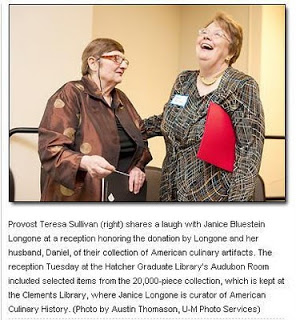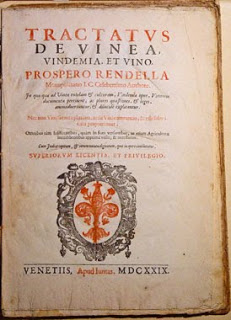 From the University of Michigan Record Update for Wednesday, June 9, 2010: Jan Longone and Provost Theresa Sullivan at a reception to honor the Longones’ donation of their culinary collection to the William L. Clements Library. Materials donated by Daniel and Janice Longone form the core of the Janice Bluestein Longone Culinary Archive, a collection of primary sources devoted to the subject of food history in America.
From the University of Michigan Record Update for Wednesday, June 9, 2010: Jan Longone and Provost Theresa Sullivan at a reception to honor the Longones’ donation of their culinary collection to the William L. Clements Library. Materials donated by Daniel and Janice Longone form the core of the Janice Bluestein Longone Culinary Archive, a collection of primary sources devoted to the subject of food history in America.At the reception sponsored by the Provost at the Hatcher Graduate Library on June 8, guests had an opportunity to view four books from the culinary collection. These books are on public display in the Audubon Room of the Hatcher Library until June 28, 2010.
Excerpts from exhibit brochure (view full brochure [pdf]):
 Tractatus de Vinea, Vindemia, et Vino
Tractatus de Vinea, Vindemia, et Vino
Venetiis, 1629, Prospero Rendella
The most significant 17th century book on wine
This rare and beautiful work covers all there was to know about wine from the classic period until its own day, as an English translation of the title page suggests: “In which things that pertain to the care and culture of vineyards, to the work of the grape harvest, and the instructions of the vintner, as well as many questions and laws are considered and lucidly explained. And not only the many types of wine but also about the trade in wine and the attention required for its skilled use are put forth. It will be especially useful and necessary for all the judges as for those occupied in the forum and also for those who attend to agriculture. With an index of chapters and a notation of worthy matters which are contained in the work with license and privilege of the Higher-Ups.” The author, a jurisprudent, discusses viticulture, how to care for vines, diseases, vinification, harvests, cellar work, commerce and legal matters. There are interesting details on various wines (Falernian, Lacrima, and numerous wines of the Naples region), religious rites in connection with wine, blessing of the harvest, sacred feasts, divine origin of the grape, wine for the mass, bacchanals, etc. There are discussions of casks and tools of the press and the harvest, and of jokes during the harvest. There are sections on an interpretation of the first codex about military rationing of food (how much wine was rationed to soldiers and how frequently) as well as the code of Constantine on military rationing of food.
 Antiquitates Culinariae; or Curious Tracts Relating to the Culinary Affairs of the Old English
Antiquitates Culinariae; or Curious Tracts Relating to the Culinary Affairs of the Old English
London, 1791, Rev. Richard Warner (1763-1857)
First and sole edition of one of the most beautiful works on early English recipes
Richard Warner was a prominent English antiquarian and divine. This book was one of the first works to examine the history of early English cookery, at the forefront of a scholarly movement that developed over the last three decades of the 18th century. The book contains Warner’s detailed introductory notes; “The Forme of Cury,” copied from an ancient vellum roll thought to have been compiled about 1390 by the master cooks of King Richard II; “Ancient Cookery, A.D. 1381,” another collection of recipes from the same vellum roll; “Ancient Cookery,” a collection of recipes from a 15th century manuscript but which almost certainly dates from a much earlier period; “Ancient Receipts to Preserve Fruits,” from the mid-17th century; an account of the enthronization feast of George Neville as Archbishop of York in the reign of King Edward IV; and of the enthronization feast of William Warham as Archbishop of Canterbury in 1501. The double-page colored plate titled “A Peacock Feast” which is present in this volume, was removed from most copies, owing to a dispute with the original publisher.
 A Domestic Cook Book
A Domestic Cook Book
Paw Paw, Michigan, 1866, Mrs. Malinda Russell
Only Copy Known of First African-American Cookbook
Malinda Russell was born in Tennessee a free woman of color. On her way to Liberia at age 19, she was robbed in Virginia by a member of her party. She immediately began to work as a cook, companion and laundress. She married, had a son and was widowed after four years; using her maiden name for the rest of her life. After her husband died, she returned to Tennessee and kept a boarding house on Chuckey Mountain for 3 years, then a pastry shop for 6 years, and “by hard labor and economy, saved a considerable sum of money for the support of myself and my son.” Then, in 1864, for the second time in her life, her money was stolen, by a guerrilla party who threatened her life if she revealed who they were. “Under those circumstances, we were obliged to leave home, following a flag of truce out of the Southern borders.” Hearing that Michigan was the Garden of the West, she moved there. Forced to leave the South because of her Union principles, she wrote this book “hoping to receive enough…to enable me to return home.” It is quite astonishing this fragile and unique copy of A Domestic Cook Book has survived. For years, my husband Dan and I tried to discover more about her, spending our 48th wedding anniversary in the South, trying to uncover further details. Several times we felt we had come close, but in the end, we could not be certain we had located her. Not yet! Who was this indomitable woman, who never gave up? Her story is an African-American story; it is an American story. She has overcome.
 Favorite Recipes
Favorite Recipes
Charlottesville, 1912, The Ladies of Virginia
A rare American survivor – To honor Provost Sullivan
This fragile book, one of only three copies known, represents the thousands of charity or fundraising cookbooks issued by ladies’ organizations from the mid 19th century. Essentially begun as a legacy of the Civil War, the trickle of these early books published in the 1860s and ‘70s quickly became a flood that continues into our own time, as thousands of charity cookbooks have been produced in the United States to benefit every conceivable cause. These had been an under-utilized and are now becoming an increasingly-used resource for the study of American history. The popularity and rapid spread of the charity cookbook phenomenon is considered a prime example of female bonding and collective civic virtue. At a time when women were without full political rights and representation, they found these books one very effective way to participate in the public life of the nation. This particular charity was chosen to honor current U-M Provost Teresa Sullivan – from The Ladies of Virginia to the New Lady, soon to be President of the University of Virginia. Much can be learned from examining this small book. There are advertisements for the University, explaining that tuition in Academic Departments is FREE to Virginians. There is an ad for a School for Girls, run by a woman, which offers a College Preparatory program ($300). There is a list of Prominent Boarding Houses. And, a recipe for Reception Patties (for 100 guests) which uses 21 sweetbreads and six bottles French mushrooms. Perhaps in the future President Sullivan will serve this historic dish.
